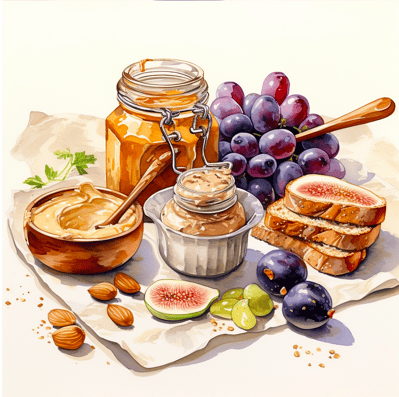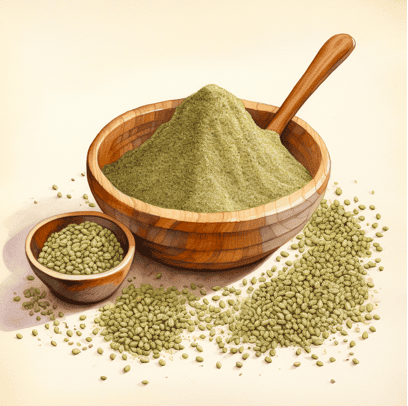
Embracing a vegan lifestyle brings numerous benefits for your health and beauty, but if you’re noticing vegan hair loss, it might be more about how an imbalance in eating. Let’s unpack this and ensure your hair gets as much love as your body.
Hi, I’m Hazel
I gave up on skincare after years of issues with acne and sensitive skin.
But after going plant-based, my skin cleared up and even started to glow. Now I help women reveal their natural beauty with simple, delicious plant-based food.
I also used to be a nurse, and love nerding out on nutritional science (high-quality science, that is).

As usual, this post is based on the strongest nutritional evidence I could find with a focus on the simplest, most delicious foods
…because who has time to waste on anything less?
The quick version:
Properly implemented vegan diets support robust hair health by providing key nutrients necessary for preventing hair loss and promoting hair regrowth. Including diverse sources of plant-based nutrients, such as hemp seeds, nutritional yeast, and leafy greens, ensures adequate intake of essential amino acids and fatty acids, crucial for hair follicle health and hair cell renewal.
Understanding Alopecia
Alopecia often starts subtly, manifesting as small patches where hair follicles suddenly shut down. This can lead to noticeable bald spots that may initially seem minor but can escalate into significant hair loss.
What Exactly is Alopecia?
Alopecia is a distressing condition where hair falls out in patches, making it a challenging type of hair loss to address. The more aggressive form, androgenic alopecia, involves a pattern that can be particularly stubborn to reverse.
The Role of Diet in Alopecia
Nutritional deficiencies can significantly impact hair health, leading to conditions like alopecia. A balanced and full vegan diet plays a crucial role in preventing and managing these deficiencies.
A Vegan Diet and Hair Cell Renewal
The right nutrients in a vegan diet are vital for hair cell renewal. They awaken dormant hair follicles, promoting robust and healthy hair growth, even in cases of androgenic alopecia.

Powering Up Hair Follicles
Incorporating plant-based foods rich in essential nutrients can support hair follicle health and combat hair loss.
Whole foods, rich in iron, zinc, and vitamins, are key to this process. Luckily, vegan/plant-based foods from fruits, vegetables to nuts and seeds are rich in all of these hair-friendly nutrients.
Debunking Nutrient Misconceptions
The idea that vegan diets are low in nutrients essential for hair health is a common myth. Instead, noticeable hair loss in vegans is a red flag for nutrient imbalances rather than the diet itself.
In reality, vegans often get more essential vitamins and have ample protein intake than those on traditional diets (1).
But you have to be eating enough – not dieting and supplementing.
Therefore hair health is not compromised by the absence of animal products but by inadequate nutrition management.
See how a plant-based diet cures alopecia here:
Feasting for Follicles: Best Foods for an Alopecia Diet Plan
Essential Nutrients for Hair Health
Knowing what your hair needs can turn your diet into your hair’s best friend. Here’s what to load up on to keep those locks flowing and healthy.

Vitamins and Minerals for Hair
Your hair craves a variety of nutrients, including vitamin B, vitamin C, and vitamin D, not to forget the mineral zinc.
Each plays a pivotal role in maintaining the health of your hair, promoting growth, and preventing breakage.
Plant-Based Sources for Hair Health
No need to worry about where to find these nutrients; many are readily available in plant-based sources. Fill your plate with leafy greens, whole grains, and citrus fruits to ensure you’re covering all bases for a lush, vibrant hair growth cycle.
You may also like:
How to use Hibiscus tea for Glowing Skin and Healthy Hair
Optimising Your Vegan Diet for Hair Health
To truly benefit your hair, it’s essential to ensure your vegan diet is well-rounded and nutrient-dense. This is how you can optimise your meal plan to boost hair health.
Rich in Iron and Omega-3s
Iron and omega-3 fatty acids are critical for maintaining healthy hair. Include iron-rich foods like pumpkin seeds and hemp seeds in your diet.
Lucky they are so easy!

Omega-3s, which are vital for hair health, can be found in flax seeds and chia seeds. This combination not only promotes hair growth but also enhances the sheen and health of your hair.
Enhancing Nutrient Absorption
To maximise the benefits, it’s crucial to enhance iron absorption. Consuming vitamin C-rich foods like citrus fruitsalongside iron sources can significantly boost absorption, helping to keep your hair strong and your scalp healthy.
Want to know more?
How to Prevent Iron Deficiency on a Plant-Based Diet
Additional Dietary Considerations
While focusing on specific nutrients is key, broader dietary habits also play a significant role in hair health.
Beyond Basic Nutrition
Expanding your diet to include a wide range of plant-based sources ensures you’re getting a spectrum of essential amino acids and fatty acids.
These nutrients are foundational for maintaining the health of your hair and preventing hair loss.
Essential Amino Acids from Vegan Sources
Nutritional yeast is a complete protein, offering all essential amino acids, which are crucial for hair structure and strength.
Including other protein-rich plant foods like quinoa, tofu, and tempeh can also help ensure you’re getting a robust profile of these important nutrients.
Fatty Acids for Hair Health
Incorporating sources of essential fatty acids is vital for healthy hair.
Flax seeds, chia seeds, and hemp seeds are excellent vegan options that provide omega-3 fatty acids, promoting hair growth and scalp health.
You may also like:
Pistachio Power: Benefits for Hair Care
The Role of Whole Foods
Emphasising whole foods in your diet supports overall health and aids in the prevention of nutrient deficiencies.
Whole grains, leafy greens, and a variety of nuts seeds contribute to a balanced diet that supports healthy hair growth and overall wellness.
Lifestyle Factors Affecting Hair Health
Your lifestyle choices play a crucial role in maintaining the health of your hair. Let’s explore how some habits might be secretly sabotaging your hair goals.
Stress and Hair Loss
High stress can lead to excessive hair loss.
Managing stress through mindfulness, yoga, or other relaxation techniques can significantly improve your hair health. It’s about keeping both your mind and your hair in good shape.
Weight Management and Hair Health
Rapid weight loss can shock the body and lead to hair loss.
Ensuring a gradual and healthy weight management plan is crucial for maintaining the health of your hair. Nutrient-rich, balanced meals are the key to avoiding drastic changes that impact your hair.
For really healthy weight-loss, really plant-protein rich beans and other legumes. Find out the easiest way to do that here:
How to Effortlessly Eat More Legumes Everyday
Vegan Diet Hair Loss
Wrapping up, a vegan diet, when done right, is not just good for the planet—it’s great for your hair too. Remember, vegan diet hair loss is often more about nutrient balance and lifestyle than the absence of animal products. Ensuring you get enough iron, essential vitamins, and healthy fats can transform the health of your hair.
References
Most references below will link to the original peer-reviewed study itself. However, sometimes I will link to a video over at NutritionFacts.org instead, which is by far the single best resource of brutally transparent nutritional evidence you will ever see. Dr Greger tells a great story about the realities of the science and if I think you will benefit more from one of his videos, the link will take you there instead.
Happy nerding!